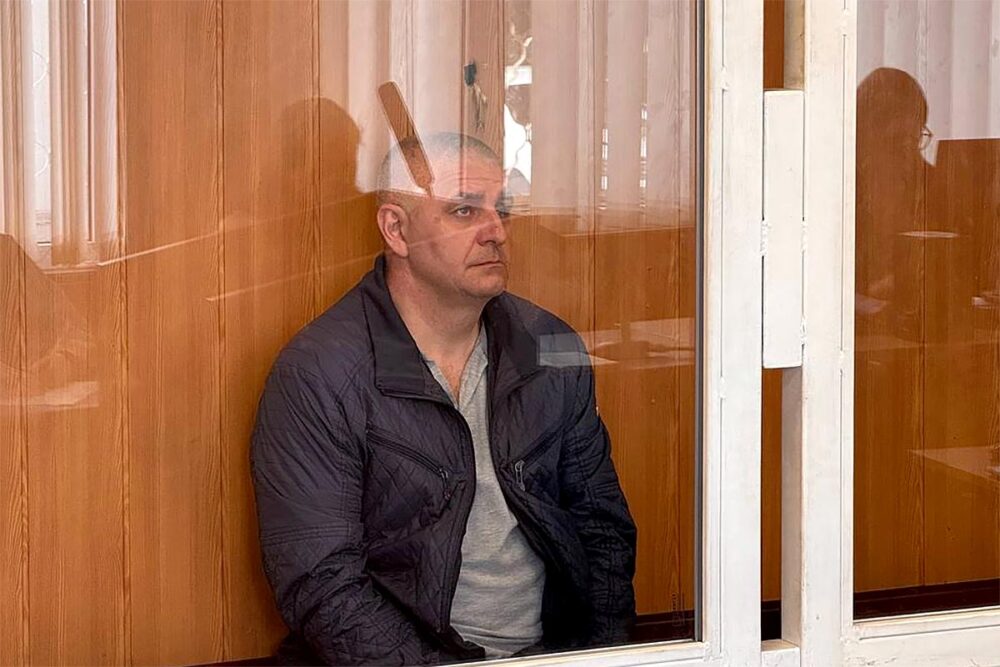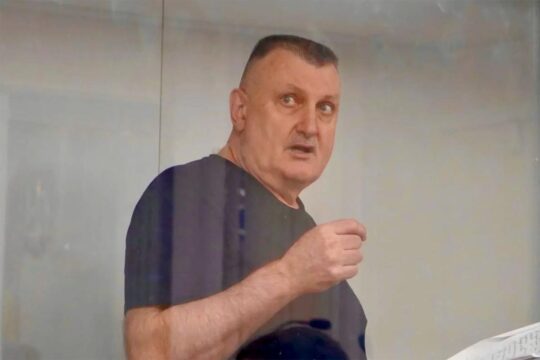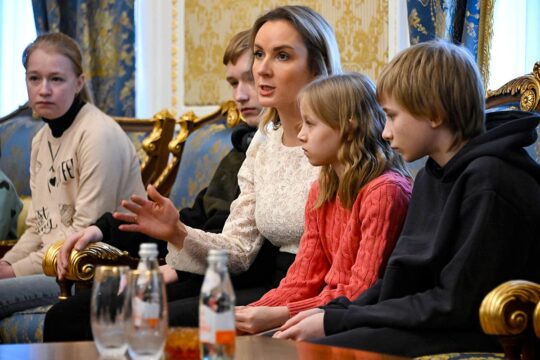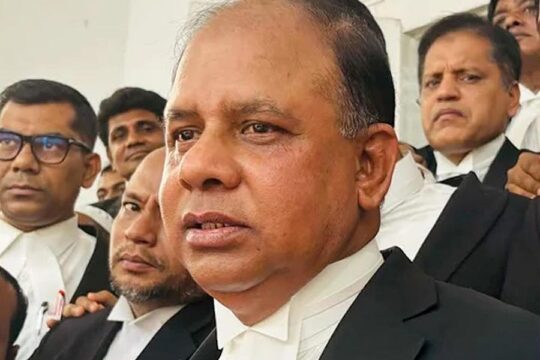Now it is up to the judges of the Khadzhybey district court of Odesa to determine his fate.
Ihor Huryakov, the former head of the Kherson pre-trial detention centre, is accused of high treason – collaborating with the enemies during the occupation of Kherson and ‘offering’ them the institution. The defendant denies the accusations. And Huryakov is not an average defendant. He is also a victim: the occupiers kidnapped him and held him captive in a torture cell for several days.
In mid-May 2022, the Russian army kidnapped Huryakov, then acting head of the Kherson pre-trial detention centre, and his deputy, Yevhen Usachov. This information was shared on Facebook by Gayane Oganesyan, the head of the Kherson City Council press service at the time. “In recent days, Russian military men forced their way into the Kherson pre-trial detention centre. I say forced their way because Ihor Huryakov and the deputy head of the detention centre, Yevhen Usachov, showed resistance and refused to let the occupiers onto the premises,” Oganesyan said.
A propaganda video?
Later, Russian channels released a propaganda video in which Huryakov urged his subordinates to continue working and said that he cooperated with the SBU, the Security Service of Ukraine. He also added that the institution had appealed to Russian law enforcement authorities to reinforce security at the detention centre to prevent any further riots against the occupiers.
“Yes, I am ready to continue fulfilling my duties to stabilise the situation,” the head of the pre-trial detention centre said in the video while anxiously rubbing his hands.
Oganesyan was convinced that such a video with Huryakov could have only been recorded under duress. She pointed out that prison officials had not been instructed to evacuate. “I appeal to the State Criminal Enforcement Service. You failed to act, and because of your indifference, orcs are torturing people. Employees are forced to make decisions at gunpoint... Neither the Ministry of Justice nor you have ever publicly addressed the employees of the penitentiary services or those behind bars with words of support,” Oganesyan said.
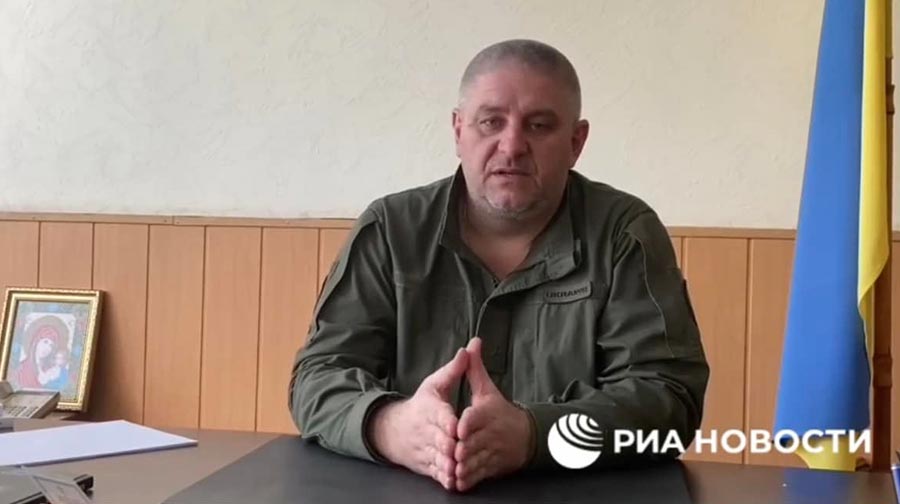
At the end of August 2023, the SBU initiated criminal proceedings for violation of the customs of war. Later, two Russian servicemen were identified and accused of torturing people in Kherson. Among the victims were Huryakov and his deputy Usachov. According to the investigation, armed Russian military men kidnapped both men and threatened them with physical violence. They were first taken to the military commandant’s office and then placed in a cell in the basement of the Kherson court of appeal. It was a torture cell equipped by the occupiers.
According to the investigation, Huryakov and Usachov were interrogated by four Russian military men for three days. The two men were restrained and held in the same position for over an hour. The interrogation was accompanied by constant beatings with fists and feet all over their bodies, and electric shocks were used. There were also threats to kill them.
Currently, two occupiers involved in the kidnapping and torture of Huryakov and other individuals were identified by the SBU; they are being tried in absentia in Kherson. The first is Colonel Viktor Bedryk, the self-appointed commander of the Kherson oblast, and the second is his subordinate, Oleksandr Chychkan.
Huryakov “voluntarily defected”
At the end of November 2022, employees of the State Bureau of Investigation (SBI) detained the acting head of the Kherson pre-trial detention centre, as well as his deputy for operational duties. According to the investigation, after the Russian invasion, these two employees defected to the enemy and were given positions in an illegally created authority.
The SBI states that the suspects followed the occupiers’ criminal orders and kept Kherson activists imprisoned in the pre-trial detention centre. “The head of the Kherson pre-trial detention centre betrayed his oath at the beginning of the temporary occupation and voluntarily defected to the enemy. His deputy for operational duties did the same,” their detention notice reads. “The two of them helped the enemy to create an illegal entity called the Penitentiary Service of the Kherson Region, which became part of the Russian Federation’s penitentiary service.”
The SBI also pointed out that Huryakov became a ‘hero’ of the propaganda disinformation campaign, urging people not to follow the Ukrainian authorities’ orders and to collaborate with the enemy.
In January 2023, individual indictments against Huryakov and Usachov were submitted to the court. “The former administration of the Kherson pre-trial detention centre, which ‘offered’ the institution to the occupiers, will be brought to justice,” the SBI stated on its official website.
During one of the hearings, Usachov’s defence lawyers emphasised that the defendant did not voluntarily remain in his position: the occupying authorities tortured him and subjected him to psychological pressure, including threatening him and his family with physical violence.
Huryakov tried in Odesa
The case of Huryakov went then to Odesa, to the Khadzhybey District Court. The panel of judges are hearing the parties, considering witness testimony, examining evidence, and determining whether the defendant betrayed his oath and voluntarily defected to the enemy or not.
If proven guilty, Huryakov faces 15 years in prison or life imprisonment. While waiting for the verdict, he is held in the Odesa pre-trial detention centre. Huryakov rejects the accusations and says the case has been fabricated.
His lawyers emphasise that he remained in the pre-trial detention centre only because there was no order for evacuation, and there were more than 200 prisoners in his institution for whom he was responsible. At that time, the detention centre was under Ukrainian authority. It was only in May 2022 that the Russians took it under their control. The defence lawyers also emphasise that the propaganda video showing their client was recorded under pressure and after he had been tortured.
The prosecution argues that Huryakov collaborated with the enemy voluntarily. According to prosecutors, Russian military men did not kidnap him to force him to collaborate, but for different reasons.
“I cannot defame the man”
In October, Anatoliy, a witness for the prosecution who was held in the Kherson pre-trial detention centre before and during the occupation, joined the proceedings via video conference from the correctional facility, where he is currently serving his sentence.
The witness stated that Huryakov had remained at his position during the occupation, when the institution was seized by Russian troops. According to him, on 1 May 2022, armed Russian troops forced their way into the pre-trial detention centre. “Mr. Huryakov would enter every cell, accompanying Russian military officers, who would introduce themselves. Of course, this was not done in a civil manner,” Anatoliy said.
He added that all the inmates were forced to lie face down on the floor and were questioned about why they were there. They were looking for Anti-Terrorist Operation fighters. “I cannot say that there was any brutality, because the man did not show such behaviour. Russian soldiers were present, but there was no beating nor shooting,” Anatoliy said.
The witness stated that at that time, in early May 2022, it was the first and the last time he saw Huryakov with Russian servicemen. He did not stay there long. After that, the defendant disappeared.
The defendant’s lawyers continued the questioning.
- “Please tell us on what grounds you concluded that Huryakov continued to work, carry out his duties, etc., given that you had not seen him since May?”
- “I made these conclusions because when the Russian authorities took over, many of the screws [Pejorative word for prison guards] fled or refused to collaborate. It was a turning point when they switched to the Russian side. They had to decide whether to flee or stay. Mr. Huryakov walked around with Russian soldiers. I cannot say whether he was forced to do so or whether he did so voluntarily. I cannot defame the man,” the witness answered.
“With bags over their heads”
At the end of March 2025, it was the turn of Yuriy, the last witness for the prosecution, to be questioned. The man, who is currently under investigation, joined the proceedings via video conference from the pre-trial detention centre. During the occupation of Kherson, he was also held in the pre-trial detention centre. The judge made sure that the witness had been advised of his rights and obligations and asked him to read the oath.
- “Do you have any grounds for incriminating Huryakov?”
- “No.”
Yulia Orel-Melnyk, a prosecutor at the Kherson regional prosecutor’s office, began with questions about the events of 2022.
- “Please tell us, do you remember when the facility was taken over and when it came under the jurisdiction of the Russian Federation? Do you remember, for example, the month?”
- “Yes, in May. They broke into the pre-trial detention centre and shot my cellmate.”
-“Please tell us, if you remember, what was the job title of Ihor Stanislavovych Huryakov at that time?”
- “He was the head of the pre-trial detention centre.”
- “Do you know if Huryakov remained working in the detention centre after the occupation, or perhaps in another penitentiary institution, if you know?”
- “As far as I know, he stayed until he was replaced by someone else, until they replaced the entire staff.”
- “And when was that?”
- “Sometime in June.”
The prosecutor also asked when the witness last saw Huryakov.
- “The last time I saw him was when the Ukrainian government was still in charge. Somewhere around January.”
- “You said it was in June?”
- “I last saw him when the Ukrainian government was in charge.”
The witness explained that during the occupation, it was impossible to get around freely, and he personally did not see Huryakov in the pre-trial detention centre. Yuriy spent the entire period of occupation in the Kherson pre-trial detention centre. His cellmate was shot dead for no reason by Russian soldiers who broke into the institution.
After the prosecutor, the questioning was continued by Huryakov’s defence lawyers.
- “Please tell us, have you heard from anyone what happened to Huryakov after Russian occupiers entered the pre-trial detention centre in May?” lawyer Lilia Okhrymovych asked.
- “They were taken away, both Usachov and Huryakov, with bags over their heads.”
- “Were they taken away against their will?”
- “With bags over their heads, so you tell me.”
The questioning ended with the question of whether the witness knew what position the defendant held after June 2022. However, the witness was unaware of it.
Huryakov’s lawyers filed a motion to question witnesses for the defence: employees of the Kherson pre-trial detention centre, Huryakov’s wife and relatives, as well as some local police officers. Some of these witnesses were in the torture cell with the defendant. They also requested a recess to provide contact details for witnesses and summon them to court. The judge granted the motion. The questioning of the defence witnesses was scheduled for subsequent hearings.
“Intimidation of the staff, violence and incitement to collaboration”
The organisation Protection for prisoners of Ukraine, in its website publication, points out that at the beginning of the full-scale invasion, some of the institutional staff in the Kherson region did not show up for work, and the issue of evacuation was never resolved due to a lack of clear instructions. For a considerable period of time, the issue of the penitentiary institutions’ evacuation was unclear to both convicts and the administration of these institutions.
In a statement in August 2022, the ministry of justice noted that decisions on the evacuation of convicts and detainees, as well as notifications of its start, should be made by the relevant military command together with the military administrations. But uman rights defenders argue that “by default, the State Criminal Enforcement Service has the right to transfer people in exceptional circumstances without waiting for a decision from the Military-Civil Administration, which could have saved at least some of the prisoners”.
On 18 May 2022, the State Criminal Enforcement Service of Ukraine posted a statement on the situation in the temporarily occupied territory. Most institutions continued their work due to the impossibility of evacuation.
“This was possible until the invading state started to aggressively take control of the institutions within the State Penitentiary Service of Ukraine. This occurred in particular in the Kherson region, which has recently been the subject of widespread discussion,” the publication states. “The actual takeover of institutions was accompanied by intimidation of the staff, violence and incitement to collaboration. While not commenting on the specific individuals who hold positions in the Kherson region until the Ukrainian courts have issued their conclusions in their regard, we can only confirm that the Russian Federation has effectively seized control of the State Penitentiary Service institutions,” it adds.
According to Tetiana Babkova, one of Hutyakov's defence lawyers, he received instructions to continue working during the occupation. The judge sent a request to the ministry of justice to obtain a copy of such instructions, if they exist, for independent examination.
This report was produced thanks to a grant by Fondation Hirondelle/Justice Info. A full version of this article was published on July 23, 2025, in "CPI" (Public Investigations Centre).


